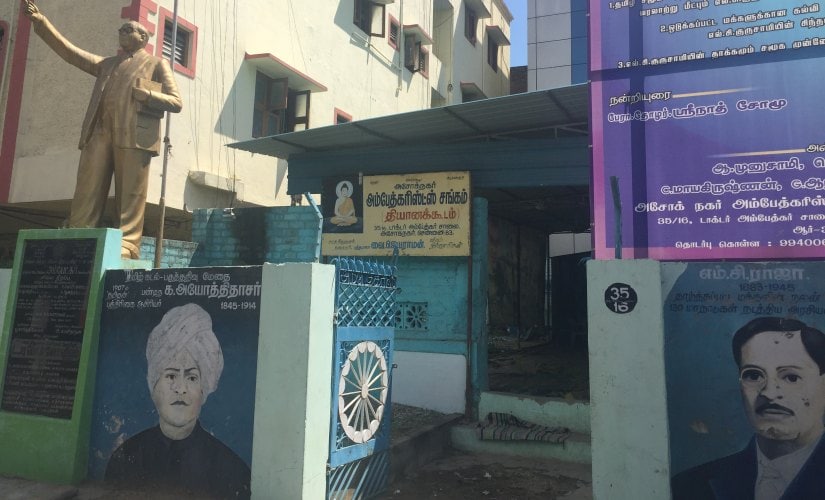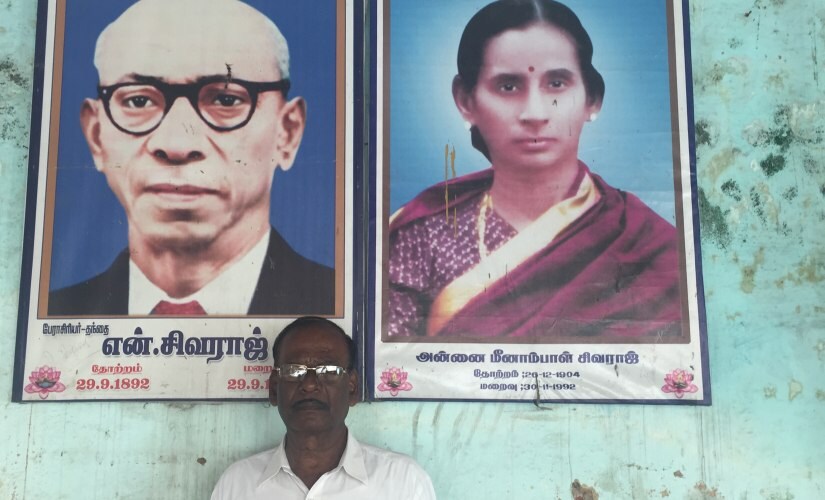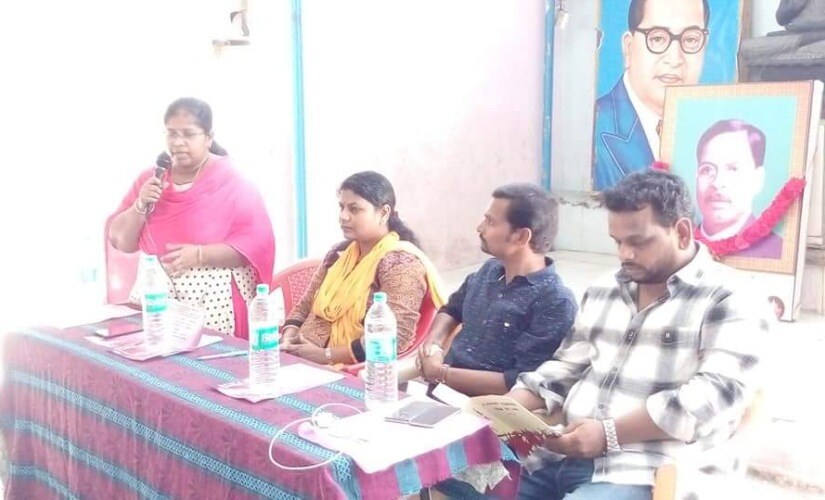The quaint little place on one of the busiest roads in Ashok Nagar, Chennai attracts little attention. Set among a slew of up-market places including restaurants and cafes, the place adorned by a life-size statue of Ambedkar and walls carrying images of Dalit leaders from Tamil Nadu – C Ayotheedasar and MC Rajah – could hardly catch an eye. Yet quietly in its own way, the Ashok Nagar Ambedkarists Sangam (The Ashok Nagar Ambedkarists association) has been documenting history. Set up over fifty years back, the Sangam aims to propagate the ideals of leaders like Ambedkar and to create awareness among the oppressed. It is not uncommon to see a small, motley crowd animatedly discussing an intense subject on any given day. “A few of us came together to start this in 1967,” recounts 70-year-old Buddhapala V Jayaraman, one of the architects of the Sangam. “It was initially intended and run as a night school for our children. We still run the night school but don’t just stop with that.” The night school caters to the students from the slums in and around Ashok Nagar. [caption id=“attachment_5739581” align=“alignnone” width=“825”]  The entrance of the Sangam. All images courtesy of the author.[/caption] Named as Annal Ambedkar Mandram Night School in 1967, the Sangam was renamed as Ambedkarist Peravai in 1974. In 2003, it acquired its present name and an additional tag of being a meditation centre. “We also celebrate every purnima,” Jayaraman says, pointing to the large statue of Buddha in the centre of the premises. But since last year, the Sangam has begun doing something extraordinary. It has started reintroducing into public consciousness the images of long-forgotten Dalit leaders by way of celebrations. “We have started to celebrate the birth anniversaries of forgotten leaders like Ayotheethasar, MC Rajah, Mayor Sivaraj, Annai Meenambal etc. They are the leaders who have made stellar contributions to society and yet today, we only remember them as names of streets or awards. By celebrating them, we intend to throw some light on their life, on their contributions. During such celebrations, we unveil their portraits in the Sangam premises. More recently, we had unveiled the portraits of Savitribhai Phule, Ramabai Ambedkar, and Savitha Ambedkar,” Jayaraman says, pointing to the many portraits hanging on the wall. Besides, experts take part in celebrations to speak about the leaders. “I have noticed that over the last one year, many new faces have been attending the discussions. There are people from locality who would step in and find it interesting. People who come have discussions and arguments, or simply want to know who these people are – and why are we speaking about them.” [caption id=“attachment_5739601” align=“alignnone” width=“825”]  Jayaraman in front of portraits of Annai Meenambal Shivaraj and N Sivaraj[/caption] “This is something that the political parties cannot perhaps do. With their broad-based approach and larger political considerations, they cannot perhaps penetrate into local pockets to create awareness about social justice history of the State,” observes activist Meena Somu, who has been associated with the Sangam for a year now. “I have seen how the youth step into the premises just out of curiosity to know who that person is. It is an irony that the other side of the large curtain that acts as partition between the premises of Sangam and the adjoining piece of land carries the image of an actor. But I believe the Sangam offers a platform for the youth to identify themselves with social causes.” K Padmanabhan, a lawyer who has been involved in the activities of the Sangam for five years now says Ashok Nagar, despite its up-market character cultivated much later, remains very much the house of three major Dalit hamlets. “That perhaps explains why the Sangam was actually set up here five decades ago. Through the Sangam, we propagate the ideals of leaders like Ambedkar and Periyar. We have regular meetings and celebrations where locals also take part. I think it is absolutely important to have a sangam like this in a place like Ashok Nagar just so we do not forget our roots or our history.” [caption id=“attachment_5739631” align=“alignnone” width=“825”]  MC Rajah celebration event[/caption] The importance is not new found. Madurai based Dalit scholar Stalin Rajangam points out how such Sangams played an active role in documenting history way back in 1960s and 70s. “It was this Sangam that first published a book in Tamil on the Poona Pact. There were many such Sangams in 1960s and 70s which were platforms of intense political discussions. In a way, they set a precedent to such discussions that keep happening in the State.” Sadly, the Sangam is a cynosure of all eyes not for what it stands for but where. “You see, Ashok Nagar has developed over the years and there are affluent people who have set their eyes on this place” rues Jayaraman. But Padmanabhan whose involvement with the Sangam began with appearing as a lawyer on a legal tussle is confident that all such efforts can be thwarted. “This place is rooted in history. We cannot let it go,” he says. Padmanabhan hopes that when finally things get sorted out, the Sangam premises could be used for better and more meaningful purposes. “We hope to establish a Dalit cultural academy and a Buddha Vihar. Someday, that will certainly happen.”
Set up over fifty years back, the Sangam aims to propagate the ideals of leaders like Ambedkar and to create awareness among the oppressed.
Advertisement
End of Article


)

)
)
)
)
)
)
)
)



